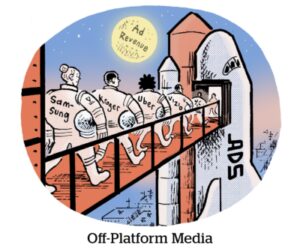Here’s today’s AdExchanger.com news round-up… Want it by email? Sign up here.
The Ad-Supported Bird Gets The Worm
Free-to-play reigns supreme in the mobile game market. Angry Birds, a mobile gaming OG that found early success using paid downloads, is now putting all its eggs into the ad-supported basket, Ars Technica reports.
Rovio had already shifted to primarily free games and ad revenue. But releasing a pay-to-play remake of the original Angry Birds game put a dent in the earnings of its many ad-supported sequels.
The paid-for Angry Birds version charges players 99 cents for 390 ad-free levels. It’s currently the App Store’s second-best-selling paid download, but it only nets Rovio an estimated $30,000 in monthly revenue. In contrast, the free-to-play Angry Birds 2 garnered 900,000 new downloads last month and over $9 million in revenue, making it the 74th-highest-grossing game on iOS.
Clearly, there’s more money in the ad-supported model than in pay-to-play.
So Rovio is delisting the remake from the Google Play Store. And the game will be renamed to “Red’s First Flight” in the Apple App Store. With the renamed version and metadata likely stripped of branded keywords, the paid-for app won’t interfere with Rovio funneling people who search for “Angry Birds” to its free, ad-supported apps, where the developer makes more money.
Subscription By Subtraction
For ad-based apps and media companies, subscription revenue looks like green pasture.
But as Rovio shows, subscriptions can create a dangerous undercurrent that drags people away from the core service.
Social media networks – namely, Facebook, Instagram, Snapchat and Twitter – take a risk with newly launched subscription packages, Bloomberg reports. Especially since social subscriptions are expensive and provide little value. (Notably, they aren’t even ad-free, though the question shows up in the FAQs.)
Twitter Blue costs $8 via site or $11 by iOS app. Meta Verified, as its subscription is called, costs $12 or $15 per month. The up-charging for iOS users publicly reinforces the costs of the Apple Services fee on app developers.
But Zuck and Elon are hardly winning hearts and minds. Twitter made two-factor authentication – basic account security – exclusive to subscribers. Its approach with Blue has been to charge to prevent account degradation, rather than gain coveted new services.
Meta Verified promises increased exposure, so influencers will pay. But one of its main selling points is basic customer service – the kind of thing users should just have.
Anything in the name of subscription revenue. But what if that “anything” is your good name?
Driving Change
Automakers are taking on more and more media and SaaS company capabilities. Or are at least trying to.
A lot of the effort is to catch up with Tesla on battery charge and driving AI, but they’re also copying Tesla’s software-focused approach and leaning into the car as a machine built around a large screen.
Mercedes-Benz made $1 billion last year by selling software upgrades to its cars, which come via one-off payments or subscription (everyone’s in on the subscription craze).
Mercedes also just announced a partnership with Google, which Reuters reports will provide mapping services to route cars. Google has similar deals for onboard services with General Motors, Ford and Nissan.
New Mercedes cars will also come pre-stocked with an “infotainment system” (their words) that includes TikTok to pair with the “superscreens” that will now cover the dashboard, TechCrunch reports.
But Wait, There’s More!
Warner Media bets against the trend with a profit-first, no-growth streaming strategy. [The Information]
With false advertising lawsuits on the rise, brands risk long-term harm to their image. [Digiday]
A basic iPhone feature (uhh … your passcode) helps criminals steal people’s digital lives and app-based finances. [WSJ]














